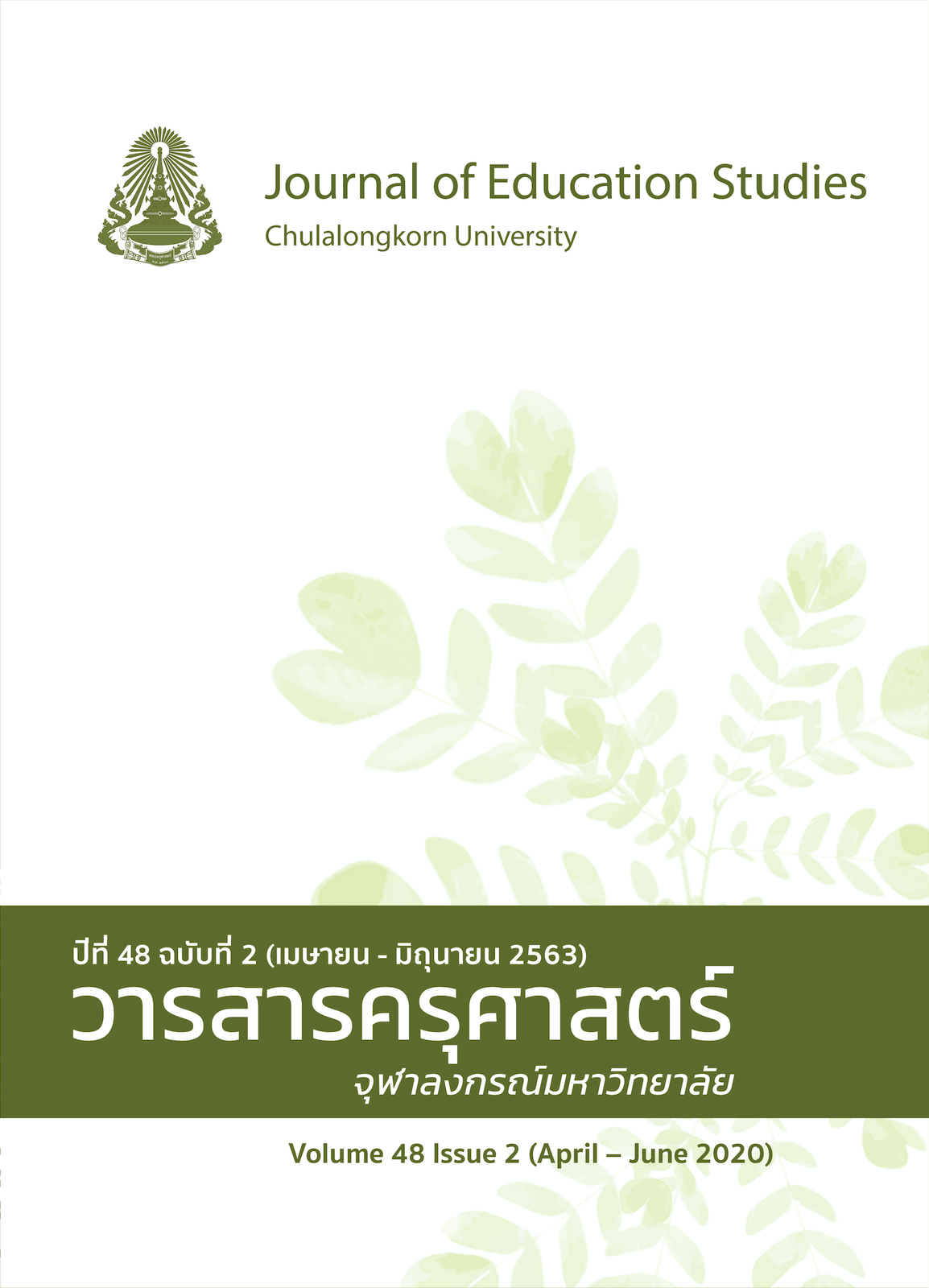The Development of Information Literacy Development Model of Undergraduate Students in Journalism Programs
DOI:
https://doi.org/10.14456/educu.2020.48Keywords:
model development, information literacy, journalism studentsAbstract
This mixed-method research aimed to establish an information literacy development model for undergraduate students studying journalism. To develop a draft of the model, the researcher conducted in-depth interviews of 20 key research informants, and arranged a focus group with 7 experts consisting of academics and professionals in library and information science and journalism to verify and test the model. The “Participative Management, Collaboration, Integration” model (PCI), including components such as factors, stakeholders, and strategies related to the information literacy development of undergraduate students in journalism programs, was developed as a result of the study. The results of the model trial revealed that the integration of information literacy lessons into journalism classes could enhance students’ IL skill. Also, students’ satisfaction regarding the lesson and activity integrated in the trial class was shown to be at the highest level.
References
ดวงแก้ว เงินพูลทรัพย์. (2560). การพัฒนาทักษะการรู้สารสนเทศของนักศึกษาระดับปริญญาตรีสาขาวารสารศาสตร์ [วิทยานิพนธ์ปริญญาดุษฎีบัณฑิต ไม่ได้ตีพิมพ์]. มหาวิทยาลัยสุโขทัยธรรมาธิราช.
ดวงแก้ว เงินพูลทรัพย์, ชุติมา สัจจานันท์, จันทิมา เขียวแก้ว, และ พิมพ์รำไพ เปรมสมิทธ์. (2561). การพัฒนาแบบทดสอบทักษะการรู้สารสนเทศสำหรับนักศึกษาระดับปริญญาตรีสาขาวารสารศาสตร์. วารสารบรรณศาสตร์ มศว, 11(1), 176–190.
เทอดศักดิ์ ไม้เท้าทอง. (2554). การบูรณาการการรู้สารสนเทศในกระบวนการเรียนการสอนรายวิชาศึกษาทั่วไปหลักสูตรระดับปริญญาตรี [วิทยานิพนธ์ปริญญาดุษฎีบัณฑิต ไม่ได้ตีพิมพ์]. มหาวิทยาลัยขอนแก่น.
ยุพาวดี เจริญรัมย์. (2554). แบบจําลองการพัฒนาการรู้สารสนเทศของนิสิตมหาวิทยาลัยมหาสารคาม[วิทยานิพนธ์ปริญญามหาบัณฑิต ไม่ได้ตีพิมพ์]. มหาวิทยาลัยมหาสารคาม.
ยุวดี คำปวน. (2560). การบูรณาการ: เส้นทางแห่งการเรียนรู้ในศตวรรษที่ 21. วารสารการบริหารและนิเทศการศึกษา มหาวิทยาลัยมหาสารคาม, 8(1), 25–38.
ภาษาอังกฤษ
Abunadi, I. (2018). A technology-dependent information literacy model within the confines of a limited resources environment. Information Technology & Libraries, 37(4), 119-135. https://doi.org/10.6017/ital.v37i4.9750
Agbese, F. A. O., Daramola, C. F., & Akidi, J. O. (2018). Participative decision making and employee job performance in Nigerian academic libraries. Journal of Advance Research in Social Science and Humanities, 4(7), 15-28.
Association of College & Research Libraries. (2000, January). Information literacy competency standards for higher education. American Library Association Institutional Repository. http://www.ala.org/acrl/standards/informationliteracycompetency
Association of College & Research Libraries. (2011, October). Information literacy competency standards for journalism students and professionals. American Library Association Institutional Repository. http://www.ala.org/acrl/sites/ala.org.acrl/files/content/
standards/il_journalism.pdf
Barnas, F., & White, T. (2010). Broadcast news writing, reporting, and producing (5th ed.). Focal.
Bornstein, J. (2003, 22 September). Journalism students and information competencies. The Free Library by Farlex. https://www.thefreelibrary.com/Journalism+students+and+information +competencies.-a0111848849
Corrall, S. (2008). Information literacy strategy development in higher education: An exploratory study. International Journal of Information Management, 28, 26–37.
Courtney, I. (2017). In an era of fake news, information literacy has a role to play in journalism education in Ireland: An exploratory study of journalism and media faculties and the interactions with their academic libraries [Master’s thesis]. https://esource.dbs.ie/bitstream/handle/10788/3303/msc_courtney_i_2017.pdf?sequence=1&isAllowed=y.
Diekerhof, E. (2013). Teaching journalistic research skills in digital age: Between traditional routines and advanced tools. Journal of Applied Journalism & Media Studies, 2, 231-244. https://doi.org/10.1386/ajms.2.2.231_1
Edwards, V. (2016). Research skills for journalists. Routledge.
Fain, M. (2011). Assessing information literacy skills development in first year students: A multi-year study. The Journal of Academic Librarianship, 37(2), 109–119.
Fleming, C. (2006). An introduction to journalism. SAGE.
Flood, L. S., Gasiewicz, N., & Delpier, T. (2010). Integrating information literacy across a BSN curriculum. Journal of Nursing Education, 49(2), 101-104. https://doi.org/10.3928/01484834-20091023-01
Kershner, J. W. (2009). The element of news writing (2nd ed.). Pearson.
Kuban, A. J., & Mulligan, L. M. (2014). Screencats and standards: Connecting an introductory journalism research courses with information literacy. Communication Teacher, 28(3), 188–195.
Lovitt, C., Shuyler, K., & Li, Y. (2018). Integrating information literacy into the chemistry curriculum. American Chemical Society.
MacMillan, M. (2009). Watching learning happen: Results of a longitudinal study of journalism students. The Journal of Academic Librarianship, 35(2), 132-142.
MacMillan, M. (2014). Fostering the integration of information literacy and journalism practice: A long-term study of journalism students. Journal of Information Literacy, 8(2), 3-22.
Meyer, R. K., Hunt, S. K., Hopper, K. M., Thakkar, K. V., Tsoubakopoulos, V., & Van Hoose, K. J. (2008). Assessing information literacy instruction in the basic communication course. Communication Teacher, 22(1), 22–43.
Saunders, L. (2007). Regional accreditation organizations' treatment of information literacy: Definitions, collaboration, and assessment. The Journal of Academic Librarianship, 33(3), 317-326.
Saunders, L. (2011). Information literacy as a student outcome: The perspective of institutional accreditation. Libraries Unlimited.
Shorsher, A. Y., & Bronstein, J. (2018). Three perspectives on information literacy in academia: Talking to librarians, faculty, and students. College & Research Libraries, 796(4), 535–553.
Spangler, S. (2019). Integrating information literacy in IT courses: Information technology students’ perceptions of embedded librarians. Online Journal of Applied Knowledge Management, 7(2), 29-40.
Thompson, G. B., & Lathey, J. W. (2013). An integrated model of information literacy, based upon domain learning. Information Research, 18(3), 1–14. http://www.informationr.net/ir/18-3/colis/paperC02.html#.Xedt7ugzY2w
Wang, X. (2010). Integrating information literacy into higher education curricula [Master’s thesis]. CORE. https://core.ac.uk/download/pdf/10903843.pdf
Downloads
Published
How to Cite
Issue
Section
License

This work is licensed under a Creative Commons Attribution-NonCommercial-NoDerivatives 4.0 International License.




